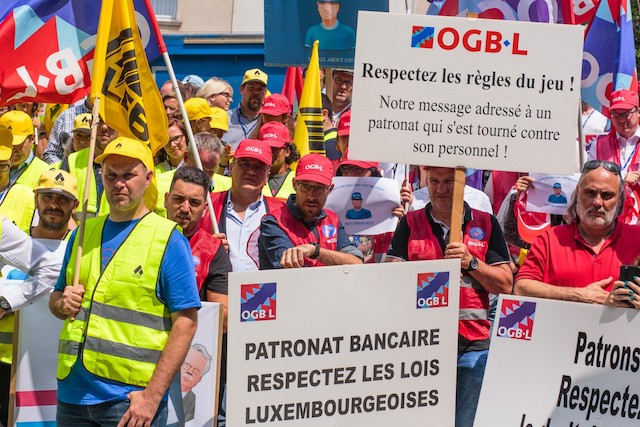The case concerning the extension of the social plan recently negotiated with Canadian bank RBC is particularly quite telling. On Friday 22 January, the OGBL and LCGB sent a press release to the country's press explaining that "after many discussions between management and the unions, an agreement on the extension of RBC's social plan has finally been found in the interests of the 43 employees concerned”.
Clearly, these 43 employees were guaranteed that if they found a job before their layoff was notified, they could be let go by RBC and pocket their severance pay. A great union victory that Aleba also announced on Monday 25 January, but specifying that it had to "fight against the management, but also against the OGBL-LCGB union, which was satisfied with a single notification on 31 January 2021 for 43 employees, which would obviously have resulted in an unacceptable loss of income for the employees concerned”.
Since then, each has called the other a liar, and the links are--temporarily?--cut. "What was written [in the Aleba press release, editor's note] is shameful," protested Véronique Eischen, central secretary of the OGBL. “The OGBL-LCGB duo have a majority stake at RBC, and we are the ones who negotiated the renewal of the social plan under these conditions. We had many discussions with management in December and early January.”
"A total lie," said Laurent Mertz, secretary general of Aleba, explaining that it was his delegates who fought for the favourable terms of the extension. "I didn’t make this up, and I don’t know why the OGBL is talking like this,” he continued. He recalled that the same kind of scenario had already occurred during the negotiation of the social plan of the Catella bank in 2018, which did not already include at the time the withdrawal of the OGBL.
The spark this time came from negotiations between Aleba and the Luxembourg Bankers’ Association (ABBL) for the renewal of the collective banking sector agreement. Last November, OGBL and LCGB complained that they hadn’t been notified of the renewal of this agreement without their consent. "It was already wrong, we warned them," Mertz insists.
Today, he is surprised not to see Nora Back, president of the Chamber of Employees (CSL), taking matters into her own hands in an attempt to calm the situation. "There is no longer any contact with Aleba," Eischen confirmed. "I’m not arguing with anyone, I work in the best interests of the employees, but I want the truth to be told."
“We are no longer in discussion, but my hand is extended. I am ready to welcome them, as long as long as Aleba representatives aren’t called into question,” Mertz stated.
United front to face the crisis?
This union fight is a bit of a blemish, given the state of the country’s economy over the past year, with nobody knowing what’s in store for companies in the future. Here, again, the unions’ opinions diverge.
"I do not see any disaster happening in the financial sector," the OGBL representative explained. “We have always had restructuring. What’s clear is that digitisation will eliminate some jobs which will be partially replaced. These are things that must be discussed at the level of the collective agreement, just like teleworking.”
For Mertz, on the other hand, staff are suffering and employment in the sector is at risk over the coming months.
It remains to be seen if, by then, the main representatives of a quarter of all employees in Luxembourg will see eye to eye.
This article was originally published in French on Paperjam.lu and has been translated and edited for Delano.
